This article was co-authored by Dale Prokupek, MD and by wikiHow staff writer, Jessica Gibson. Dale Prokupek, MD is a board-certified Internist and Gastroenterologist who runs a private practice based in Los Angeles, California. Dr. Prokupek is also a staff physician at Cedars-Sinai Medical Center and an associate clinical professor of medicine at the Geffen School of Medicine at the University of California, Los Angeles (UCLA). Dr. Prokupek has over 30 years of medical experience and specializes in the diagnosis and treatment of diseases of the liver, stomach, and colon, including chronic hepatitis C, colon cancer, hemorrhoids, anal condyloma, and digestive diseases related to chronic immune deficiency. He holds a BS in Zoology from the University of Wisconsin – Madison and an MD from the Medical College of Wisconsin. He completed an internal medicine residency at Cedars-Sinai Medical Center and a gastroenterology fellowship at the UCLA Geffen School of Medicine.
There are 14 references cited in this article, which can be found at the bottom of the page.
This article has been viewed 102,173 times.
If you're experiencing vomiting and diarrhea, your body is trying to rid itself of whatever is causing your sickness. For example, vomiting can rid toxins from food poisoning or it can empty your stomach of a virus if you have the stomach flu. Vomiting and diarrhea can be caused by a variety of things including infections with viruses, bacteria and parasites. It can also be caused by toxins, eating infected foods, some medicines and eating certain foods that for various reasons can be difficult to digest. While vomiting and diarrhea will run their course, they can cause dangerous dehydration. This can be especially true in infants, young children and in the elderly.[1]
Steps
Controlling Vomiting and Diarrhea Through Diet
-
1Stay hydrated. Try to drink plenty of pure water to replace the fluids you're losing. You can also drink herbal teas (like chamomile, fenugreek, or ginger) which can help with nausea or flat or non-carbonated ginger ale. There are several beverages you can avoid since they'll irritate your stomach and bowels, making diarrhea worse. Avoid:[2]
- Coffee
- Black tea
- Caffeinated beverages
- Sodas
- Alcohol, which will make your dehydration worse
-
2Eat more fiber. To treat diarrhea, include foods like brown rice, barley, whole grains, or fresh vegetable juices (like carrot or celery). The fiber from these foods can help your body absorb water and make your stools firmer which can slow down and stop diarrhea. Avoid eating fatty, oily or spicy foods, acidic foods (like orange juice, tomatoes, pickles), chocolate, ice cream and eggs.[3]
- For a light meal with fiber, try cooking grains in a light chicken or miso broth. Use at least twice as much liquid as grains. For example, cook 1/2 cup barley in 1 to 2 cups of chicken broth.
Advertisement -
3Take probiotics. Purchase probiotic supplements and take them according to the manufacturer's or your doctor's instructions. These can improve the balance of bacteria in your gut. If you take probiotics while having diarrhea, they can compete with the disease-causing bacteria.[4] Good sources or types of probiotics include:
- Yogurt containing active cultures
- Yeast (Saccharomyces boulardii)[5]
-
4Lactobacillus rhamnosus GG, Lactobacillus acidophilus, and bifidobacteria
-
5Eat food that is gentle on your stomach. If you don't feel like eating much, snack on salted crackers to calm any nausea or vomiting. When you do feel ready to eat something, choose food from the BRAT diet. Bananas, rice, applesauce, and toast (whole grain) can bulk up your stool and replace lost nutrients.[6]
- Avoid eating dairy which can make diarrhea worse by stimulating bowel movements.
- If you're vomiting often, avoid eating any solid foods and call your doctor.
-
6Drink tea. Ginger or herbal tea can calm your stomach and intestines. Some also contain antibacterial and antiviral properties. Always choose a ginger tea or ginger ale that contains real ginger and isn't carbonated. Ginger is safe for pregnant women, nursing women, and children over two years of age.[7]
- Consider drinking teas made from blackberry leaf, raspberry leaf, bilberry, or carob. But, avoid drinking bilberry if you're on blood thinners or have diabetes.
- Try drinking chamomile (for children or adults) or fenugreek tea (for adults). Steep one teaspoon of chamomile or fenugreek in 1 cup of hot water. Drink 5 to 6 cups of tea a day.
Using Medication and Alternative Therapies
-
1Take a diarrhea medication. While it might be best to let the diarrhea resolve on its own, you may want to slow down the diarrhea using medication. You can take over-the-counter medications like bismuth subsalicylate or a fiber (psyllium) supplement. Adults can take 2.5 to 30g of psyllium a day in divided doses.[8]
- Bismuth subsalicylate can be used to treat "traveler's diarrhea" and contains mild antibacterial properties.
- Psyllium is safe to take during pregnancy or while breastfeeding.
-
2Take a ginger supplement. For vomiting associated with food poisoning, gastroenteritis and most other non-serious causes, take 1000–4000 mg of ginger (in four divided doses throughout the day. For example, take 250–1000 mg four times a day.[9] Ginger has been used to treat nausea and vomiting of many different causes including chemotherapy-induced nausea, and the nausea of early pregnancy.
- Studies have shown ginger to be effective at relieving post-surgical nausea. It inhibits or suppresses certain types of brain and gut receptors that are related to the sense of nausea.[10]
-
3Make a ginger tea. Wash fresh ginger and cut off a two-inch piece. Peel the tan colored "skin" or peel to get to the pale ginger. Cut or grate it into small pieces to get a tablespoon. Add the ginger to two cups of boiling water. Cover the pot and boil it for another minute. Turn off the heat and let the ginger tea steep for three to five minutes. Pour into a cup and add honey if you like. Drink four to six cups of ginger tea a day.
- Use fresh ginger, not ginger ale. Most ginger ales do not contain real ginger and contain high levels of sweetener. You should avoid sweeteners while nauseous because sugar generally makes you feel worse.[11]
-
4Make an herbal tea. While more research is needed, some herbs are believed to reduce viral or bacterial infections that cause nausea. If anything, herbal teas may simply let you relax and minimize your sense of nausea. To make herbal teas, add 1 teaspoon of dried powder or leaf and steep it in 1 cup of boiled water. You can add honey and lemon to taste. Use the following:
- Peppermint
- Clove
- Cinnamon
-
5Try aromatherapy. Take peppermint or lemon essential oil and place a drop of oil on both of your wrists and temples. Both peppermint and lemon oil have been traditionally used to treat nausea. Studies suggest that these oils reduce nausea by relaxation or by influencing the part of the brain that controls nausea.[12]
- Make sure you don’t have a skin sensitivity. Either put a single drop of oil on your wrist. If you have a sensitivity, you may experience a rash, redness or itching. If so, try the other oil or another method.
- Only use essential oils, since candies or scents probably don't have real peppermint or lemon oil and are unlikely to have high enough levels of the oil to be helpful.
-
6Practice controlled breathing. Lie flat on your back and place pillows under your knees and neck for comfort. Put your hands palm down on your stomach below the rib cage. Place the fingers of your hands together so you can feel them separate. This will let you know you are doing the exercise correctly. Take a long, slow deep breath by expanding your belly, breathing through your diaphragm instead of your rib cage. The diaphragm creates suction that pulls more air into your lungs than can be achieved by expanding the rib cage.
- Research has shown that controlled, deep breathing can help relieve nausea. Other studies have indicated that breathing can help control nausea after surgery.[13]
Stopping Vomiting and Diarrhea in Children
-
1Keep your child hydrated. Young children are at higher risk for dehydration. Make sure your child is as hydrated as possible while you wait to see the doctor. Since your child may not want to drink water, offer a variety of things, including:[14]
- Ice chips (if not an infant)
- Popsicles (if not an infant)
- White grape juice
- Frozen juice slushy
- Breastmilk (if nursing)
-
2Feed your child mild foods. If your child is older than one year, you can feed her clear chicken or vegetable broths (beef broths can be given, but they often upset a nauseous stomach). You can also give juice mixed with an equal amount of water.
- Avoid giving something that's too sugary, like soda or pure juice since these tend to make diarrhea worse.[15]
-
3Give an oral rehydration solution (ORS). If the diarrhea and vomiting in infants, toddlers, or other young children lasts longer than a few hours, call your physician. The doctor might recommend an ORS, such as Pedialyte, which contains fluids and electrolytes (minerals) that are needed to prevent dehydration. You can find these at most grocery and drugstores.
- For infants and small children, start with about 1 teaspoon of ORS every minute or two. If they can keep the ORS down without vomiting, slowly increase the amount of ORS.[16] You can administer it using a spoon, medicine dropper or cup. With infants, you can wet a cotton washcloth and squeeze drops into their mouths if they won’t take the breast or bottle.
- For bottle fed infants, use a lactose free infant formula because the sugar, lactose, can make diarrhea worse.
- You can also find Pedialyte popsicles for kids that refuse to drink.
Expert Q&A
-
QuestionWhat should I drink for diarrhea and vomiting?
 Dale Prokupek, MDDale Prokupek, MD is a board-certified Internist and Gastroenterologist who runs a private practice based in Los Angeles, California. Dr. Prokupek is also a staff physician at Cedars-Sinai Medical Center and an associate clinical professor of medicine at the Geffen School of Medicine at the University of California, Los Angeles (UCLA). Dr. Prokupek has over 30 years of medical experience and specializes in the diagnosis and treatment of diseases of the liver, stomach, and colon, including chronic hepatitis C, colon cancer, hemorrhoids, anal condyloma, and digestive diseases related to chronic immune deficiency. He holds a BS in Zoology from the University of Wisconsin – Madison and an MD from the Medical College of Wisconsin. He completed an internal medicine residency at Cedars-Sinai Medical Center and a gastroenterology fellowship at the UCLA Geffen School of Medicine.
Dale Prokupek, MDDale Prokupek, MD is a board-certified Internist and Gastroenterologist who runs a private practice based in Los Angeles, California. Dr. Prokupek is also a staff physician at Cedars-Sinai Medical Center and an associate clinical professor of medicine at the Geffen School of Medicine at the University of California, Los Angeles (UCLA). Dr. Prokupek has over 30 years of medical experience and specializes in the diagnosis and treatment of diseases of the liver, stomach, and colon, including chronic hepatitis C, colon cancer, hemorrhoids, anal condyloma, and digestive diseases related to chronic immune deficiency. He holds a BS in Zoology from the University of Wisconsin – Madison and an MD from the Medical College of Wisconsin. He completed an internal medicine residency at Cedars-Sinai Medical Center and a gastroenterology fellowship at the UCLA Geffen School of Medicine.
Board Certified Internist & Gastroenterologist Water is going to be your best bet. If you drink any carbonated beverages or sugary drinks, it may make you gassy, which can make your issues worse. Alcohol is also going to be pretty bad for you. You're better off just drinking plenty of water and staying hydrated.
Water is going to be your best bet. If you drink any carbonated beverages or sugary drinks, it may make you gassy, which can make your issues worse. Alcohol is also going to be pretty bad for you. You're better off just drinking plenty of water and staying hydrated.
Warnings
- If you or your child are running a fever for more than 24 hours, call your physician right away.⧼thumbs_response⧽
- Young children are at higher risk for dehydration, so make sure to keep them as hydrated as possible while you wait to see the doctor.⧼thumbs_response⧽
- If you have blood or mucus in your stool, call your physician right away.⧼thumbs_response⧽
- Avoid using home remedies for infants under two years of age, and do not try home remedies on older children without first consulting the doctor. Call the pediatrician and ask for recommendations for all children.⧼thumbs_response⧽
- If your child is not drinking or urinating, call your child’s physician right away.⧼thumbs_response⧽
References
- ↑ http://familydoctor.org/familydoctor/en/diseases-conditions/vomiting-and-diarrhea.html
- ↑ https://www.nlm.nih.gov/medlineplus/ency/patientinstructions/000122.htm
- ↑ Dale Prokupek, MD. Board Certified Internist & Gastroenterologist. Expert Interview. 16 April 2020.
- ↑ Dale Prokupek, MD. Board Certified Internist & Gastroenterologist. Expert Interview. 16 April 2020.
- ↑ http://www.ncbi.nlm.nih.gov/pmc/articles/PMC3296087/
- ↑ http://www.ncbi.nlm.nih.gov/pubmed/15802416
- ↑ http://www.ncbi.nlm.nih.gov/pubmed/15802416
- ↑ https://www.drugs.com/dosage/psyllium.html
- ↑ Ozgoli, G., Goli, M., and Simbar, M. Effects of ginger capsules on pregnancy, nausea, and vomiting. J Altern Complement Med 2009;15(3):243-246.
- ↑ Ernst E, Pittler MH. Efficacy of ginger for nausea and vomiting: a systematic review of randomized clinical trials. Br J Anaesth 2000;84:367-71.
- ↑ http://www.diabetes.co.uk/high-low-blood-sugar-symptoms.html
- ↑ http://www.cancer.org/treatment/treatmentsandsideeffects/complementaryandalternativemedicine/complementaryandalternativemethodsandcancer/complementary-and-alternative-methods-and-cancer-using-cam-safely
- ↑ http://advance.uconn.edu/2002/020225/02022508.htm
- ↑ http://www.askdrsears.com/topics/health-concerns/childhood-illnesses/dehydration
- ↑ http://familydoctor.org/familydoctor/en/diseases-conditions/vomiting-and-diarrhea.html
- ↑ http://www.merckmanuals.com/professional/pediatrics/dehydration-and-fluid-therapy-in-children/oral-rehydration
- ↑ http://www.aafp.org/afp/2011/1115/p1119.html
About This Article
While vomiting and diarrhea will run their course once your body rids itself of whatever toxins it’s fighting, you can control these symptoms through diet. If possible, try to stay hydrated by drinking water, herbal teas, or flat ginger ale. You can also try eating brown rice, barley, whole grains, or fresh vegetable juices, which can help your body absorb more water. If these foods are too heavy, then stick to simple foods like toast, rice, applesauce, and bananas. To fight the disease-causing bacteria, try taking some probiotics, which can be found in yogurt and supplements. For more tips from our Medical co-author, including how to use aromatherapy to control diarrhea and vomiting, keep reading!
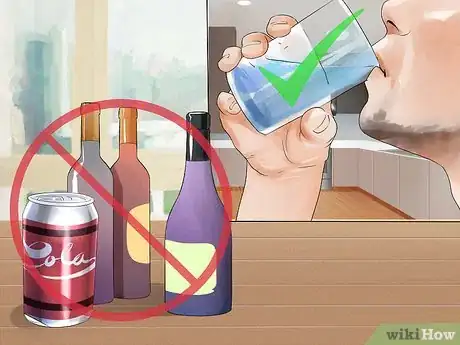
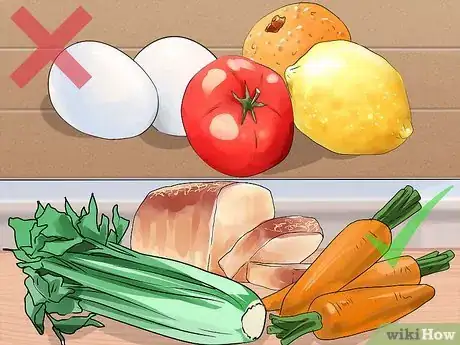

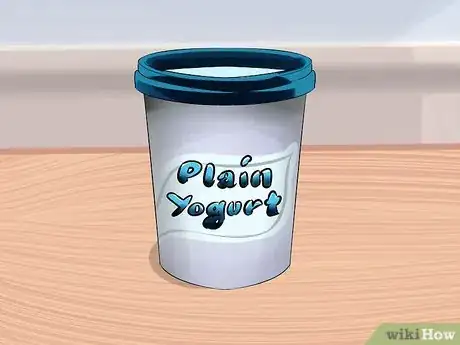
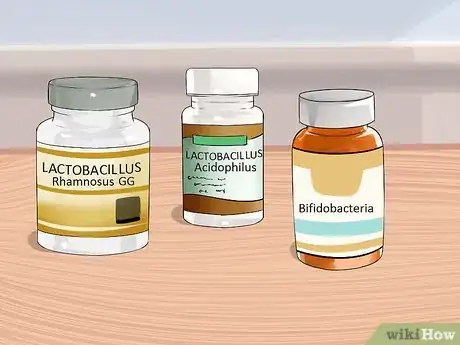
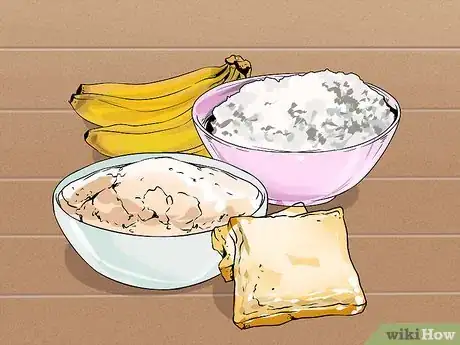


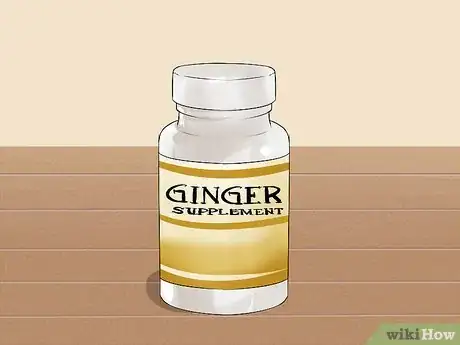


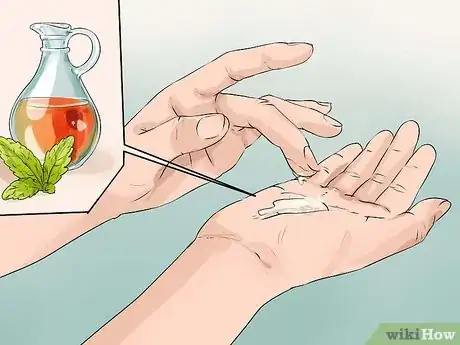







-Step-12.webp)




















-Step-12.webp)



































Medical Disclaimer
The content of this article is not intended to be a substitute for professional medical advice, examination, diagnosis, or treatment. You should always contact your doctor or other qualified healthcare professional before starting, changing, or stopping any kind of health treatment.
Read More...